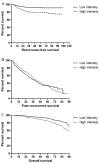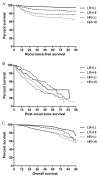Optimal Postoperative Surveillance Strategies for Colorectal Cancer: A Retrospective Observational Study
- PMID: 34298715
- PMCID: PMC8306168
- DOI: 10.3390/cancers13143502
Optimal Postoperative Surveillance Strategies for Colorectal Cancer: A Retrospective Observational Study
Abstract
This study aimed to assess whether surveillance intensity is associated with recurrence and survival in colorectal cancer (CRC) patients. Overall, 3794 patients with pathologic stage I-III CRC who underwent radical surgery between January 2012 and December 2014 were examined. Surveillance comprised abdominopelvic computed tomography (CT) every 6 months and chest CT annually for 5 years. Patients who underwent more than and less than an average of three imaging examinations annually were assigned to the high-intensity (HI) and low-intensity (LI) groups, respectively. Demographics were similar in both groups. T and N stages were higher and perineural and lymphovascular invasion were more frequent in the HI group (p < 0.001 each). The mean overall survival (OS) was similar for both groups; however, recurrence-free survival (RFS) was longer (p < 0.001) and post-recurrence survival (PRS) was shorter (p = 0.024) in the LI group. In the multivariate analysis, surveillance intensity was associated with RFS (p < 0.001) in contrast to PRS (p = 0.731). In patients with high recurrence risk predicted using the nomogram, OS was longer in the HI group (p < 0.001). A higher imaging frequency in patients at high risk of recurrence could be expected to lead to a slight increase in PRS but does not improve OS. Therefore, rather than increasing the number of CT scans in high-risk patients, other imaging modalities or innovative approaches, such as liquid biopsy, are required.
Keywords: colorectal cancer; recurrence; surveillance; survival.
Conflict of interest statement
The authors declare no conflict of interest.
Figures



References
-
- Kim M.J., Jeong S., Park J.W., Ryoo S., Cho S.S., Lee K.Y., Park K.J. Oncologic Outcomes in Patients Who Undergo Neoadjuvant Chemoradiotherapy and Total Mesorectal Excision for Locally Advanced Rectal Cancer: A 14-Year Experience in a Single Institution. Ann. Coloproctol. 2019;35:83–93. doi: 10.3393/ac.2019.04.22.1. - DOI - PMC - PubMed
LinkOut - more resources
Full Text Sources

